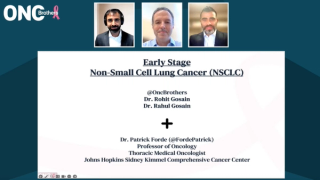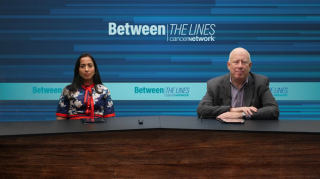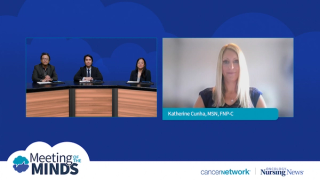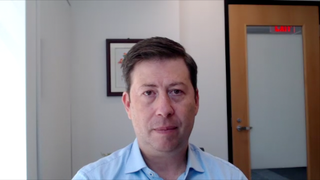
Non-Small Cell Lung Cancer (NSCLC)
Latest News
Video Series

Latest Videos
Podcasts
CME Content
More News
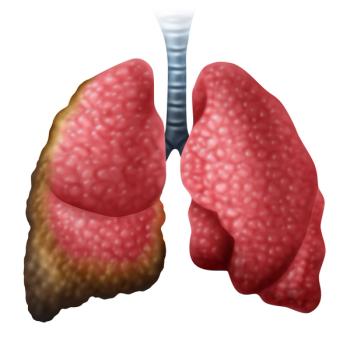
Data from the QUILT-3.055 and QUILT-2.023 studies support the accelerated approval of the nogapendekin alfa inbakicept regimens in Saudi Arabia.

Investigators will submit detailed results from the QUILT-2.023 and QUILT-3.055 trials for peer-reviewed publication and future scientific presentations.

Osimertinib plus chemotherapy improved overall survival across various subgroups in the phase 3 FLAURA2 trial, including those with CNS metastases.

Data from the phase 3 HARMONi trial support the application for the ivonescimab regimen in this EGFR-mutated NSCLC population.
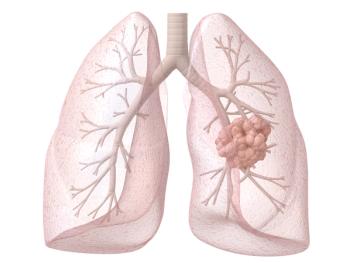
Supporting data for zoldonrasib’s breakthrough therapy designation in NSCLC came from the phase 1 RMC-9805-001 trial.

Neoadjuvant immunotherapy plus chemotherapy did not definitively increase the risk of severe pneumonitis compared with adjuvant immunotherapy.

Patients with HER2-mutant NSCLC who were naïve to systemic therapy for advanced disease experienced positive results following treatment with sevabertinib.

The randomized KANDLELIT-007 trial will enroll approximately 675 patients with advanced non–small cell lung cancer across the world.
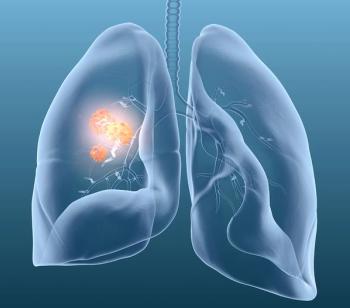
Patients currently enrolled on the RAMP 203 trial will have the option of continuing treatment with the avutometinib regimen per investigator discretion.

Treatment with ceralasertib plus durvalumab was found to be well tolerated among patients enrolled on the phase 3 LATIFY trial.

OncoPrism-NSCLC was found to be a predictive biomarker of immune checkpoint inhibitor benefit vs a general prognostic tool in patients with NSCLC.

Data from the phase 3 PALOMA-3 study support the approval of subcutaneous amivantamab in this NSCLC population.

Discover the latest breakthroughs in non-small cell lung cancer treatment from the 2025 WCLC, featuring competitive insights from leading experts.

Experts discuss the proper placement of Dato-DXd in the treatment of EGFR-mutated non–small cell lung cancer, comparing it with other potential treatments.

Patients with squamous NSCLC who received ivonescimab plus chemotherapy as first-line treatment had delayed deterioration in global health status.

The latest advancements in bispecific antibodies and antibody-drug conjugates continue to improve the personalized treatment of advanced non-small cell lung cancer.

Across 20 patients with treatment-naive NSCLC enrolled in the eNRGy trial who received zenocutuzumab, the ORR was 35%, with a median DOR of 17.1 months.

In the amivantamab/lazertinib arm, the median OS in the Asian population was not reached vs 38.4 months in the osimertinib arm for patients with EGFR-mutated NSCLC.

Developers have outlined plans to initiate a randomized phase 2 trial evaluating silevertinib in patients with newly diagnosed glioblastoma.

The developers plan to submit a new drug application to regulatory authorities for JS001sc for the treatment of first-line nonsquamous NSCLC.

No dose-limiting toxicities were observed among 12 patients with advanced EGFR-mutated NSCLC treated with quaratusugene ozeplasmid and osimertinib.

Zidesamtinib elicited positive activity in patients with advanced ROS1-positive NSCLC who previously received a ROS1 TKI in the phase 1/2 ARROS-1 trial.

Results from the SOHO-01 trial led to the approval of sevabertinib for patients with non-squamous NSCLC.

The regulatory decision regarding the subcutaneous pembrolizumab formulation is based on results from the phase 3 3475A-D77 trial.

The EGFR/HER3 bispecific ADC is being evaluated in an open-label phase 1/2 study to assess its safety, tolerability, and activity in advanced solid tumors.







